Human Oncostatin M / OSM Bioactive Protein Product Attributes
Product Type: Bioactive Protein
Recombinant Oncostatin M / OSM based upon sequence from: Human
Host: QP5367 protein expressed in E. coli.
Tag: Untagged
Recommended Applications: Bioactive
Application Notes: Please contact us for application specific information for QP5367.
Bioactivity Data: TF-1 cell proliferation was significantly induced by less than 4 ng/ml of Human Oncostatin M / OSM (minimum activity of at least 2.5 x 10^5 units/mg).
Monomer or Dimer: Monomer
Amino Acid Sequence: MAAIGSCSKE YRVLLGQLQ K QTDLMQDT SR LLDPYIR IQG LDVPKL REHC RERPG AFPSE ETLR GLGRRG FLQ TLNATLGCVL HRLADLE QR LPKAQDLE R SGLNIEDLE KLQMARPNIL GLRNNIYCM A QLLDNSDT AE PTKAGRG ASQ PPTPTP ASDA FQRKL EGCRFLHGYH RFMHS VGRV FSKWGE SPN RSRRHSP HQ ALRKGVRR
Purity: Greater than 95% as determined by SDS-PAGE.
Reconstitution Instructions:
Concentration of Human Oncostatin M / OSM Protein: Lyophilized. Concentration determined by reconstitution volume.
Endotoxin Levels: Less than or equal to 1.00 EUs/ug as determined by the LAL method.
Buffer: 10 mM sodium phosphate, pH 7.5
Storage Conditions: Store at -20C to -80C lyophilized. Guaranteed for 1 year at -80C reconstituted and 3 months at 4C reconstituted.
| Recombinant Human Oncostatin M / OSM Protein General Information | |
|---|---|
| Alternate Names | |
| Oncostatin M, OSM, OncoM | |
| Curated Database and Bioinformatic Data | |
| Gene Symbol | OSM |
| Entrez Gene ID | 5008 |
| Ensemble Gene ID | ENSG00000099985 |
| RefSeq Protein Accession(s) | NP_001306037.1 |
| RefSeq mRNA Accession(s) | NM_001319108.1, NM_020530.5 |
| UniProt ID(s) | P13725 |
| UniGene ID(s) | Hs.248156 |
| HGNC ID(s) | HGNC:8506 |
| COSMIC ID Link(s) | OSM |
| KEGG Gene ID(s) | hsa:5008 |
| PharmGKB ID(s) | PA32836 |
| General Description of Recombinant Human Oncostatin M / OSM Protein . | |
| Oncostatin M (OSM) is a cytokine that is produced by macrophages, dendritic cells, and T lymphocytes during inflammatory events. The Type-I and Type-II OSM receptors are located on the cell surface of endothelial and tumor cells, contain the glycoprotein 130 (gp130) subunit, and activate the JAK/STAT signaling pathway. OSM functions to inhibit tumor cell proliferation, induce liver stem cell maturation, regulate cytokine production during hematopoiesis and inflammation, stimulate bone formation, and promote nervous system development. | |
Limitations and Performance Guarantee
This is a life science research product (for Research Use Only). This product is guaranteed to work for a period of two years when stored at -70C or colder, and one year when aliquoted and stored at -20C.

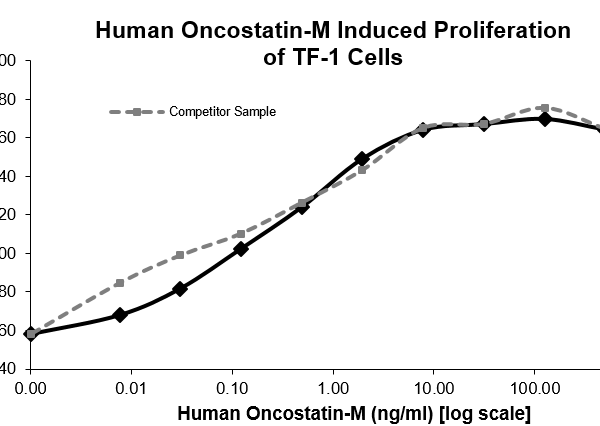


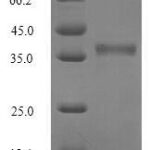
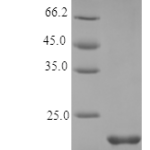
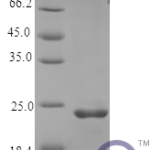

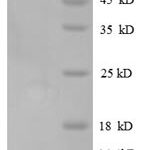
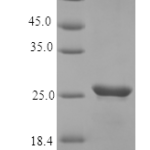

There are no reviews yet.